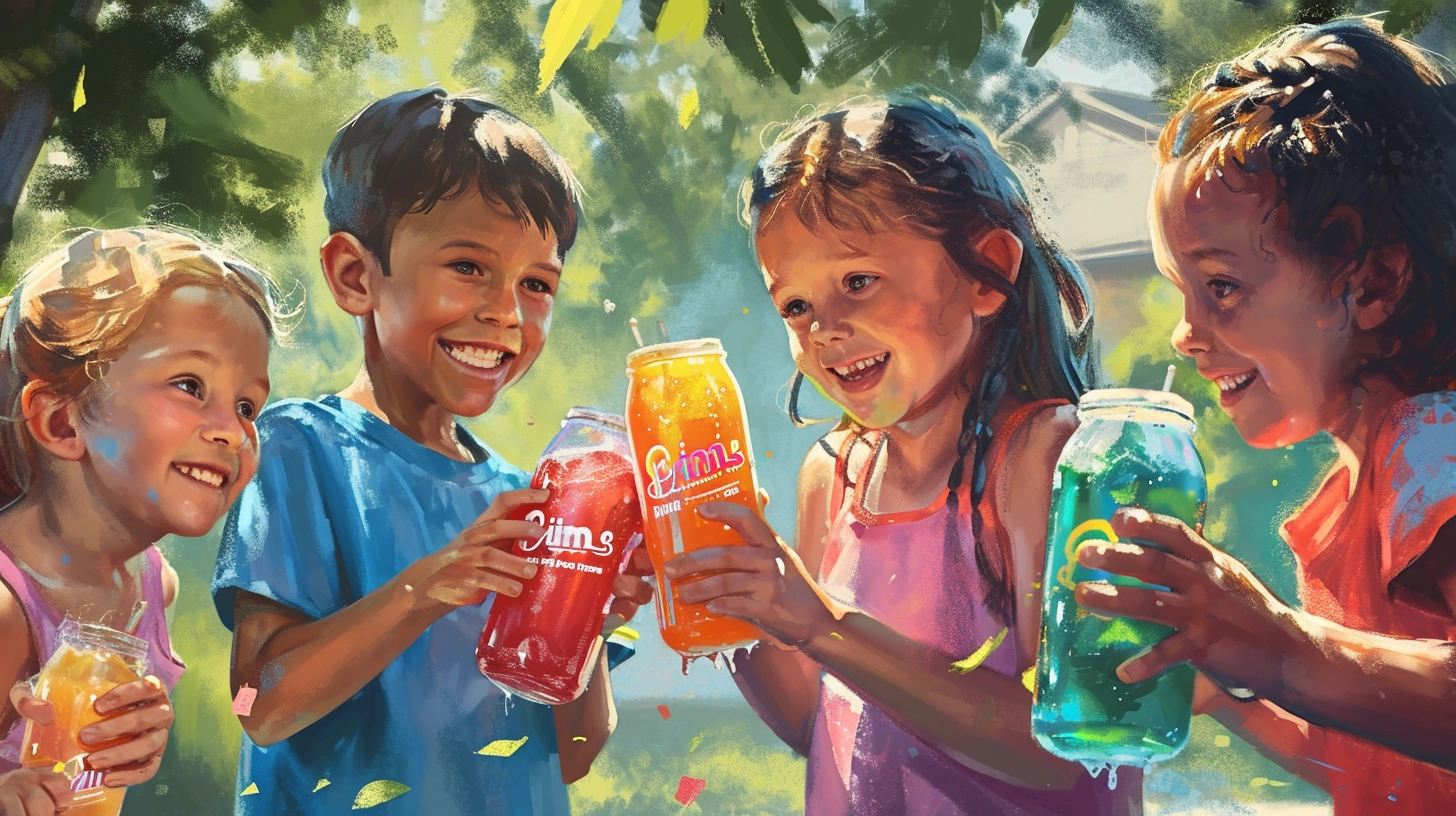Hey there, attentive Guardians of the Galaxy, we call parenthood! Can’t shake off that nagging feeling about what’s lurking in the depths of your teen’s favorite can of Prime? I totally get it—the amount of time I’ve spent scratching my head over nutrition labels could have won me a detective badge by now.
Newsflash: one innocent-looking can contains a hefty 200 milligrams of caffeine. So let’s dive into this together and unpack the real deal with Prime Drinks. We’re talking the good, the bad, and everything in between—without any sugar-coating—that might impact your cherished ones.
Consider this an invitation to join me on a fact-finding mission where we enlighten ourselves on these trendy beverages. Curious to discover more? Stick around because we’re about to crack open some knowledge!
Key Takeaways
Prime Energy drinks have 200 milligrams of caffeine, which is too much for kids and can lead to jitters and sleep problems.
Sports drinks like Prime Hydration are different from energy drinks; they don’t have caffeine, but still need to be consumed in moderation.
The American Academy of Pediatrics advises against giving caffeinated drinks to children for their health and safety.
Making DIY hydration drinks at home with water, fresh fruit, and natural sweeteners can be a healthier option for kids instead of sugary or caffeinated beverages.
Kids love Prime Drinks because celebrities endorse them, but parents should guide them towards better hydration choices like water, milk, or coconut water.
Table of Contents
Overview of Prime Drinks
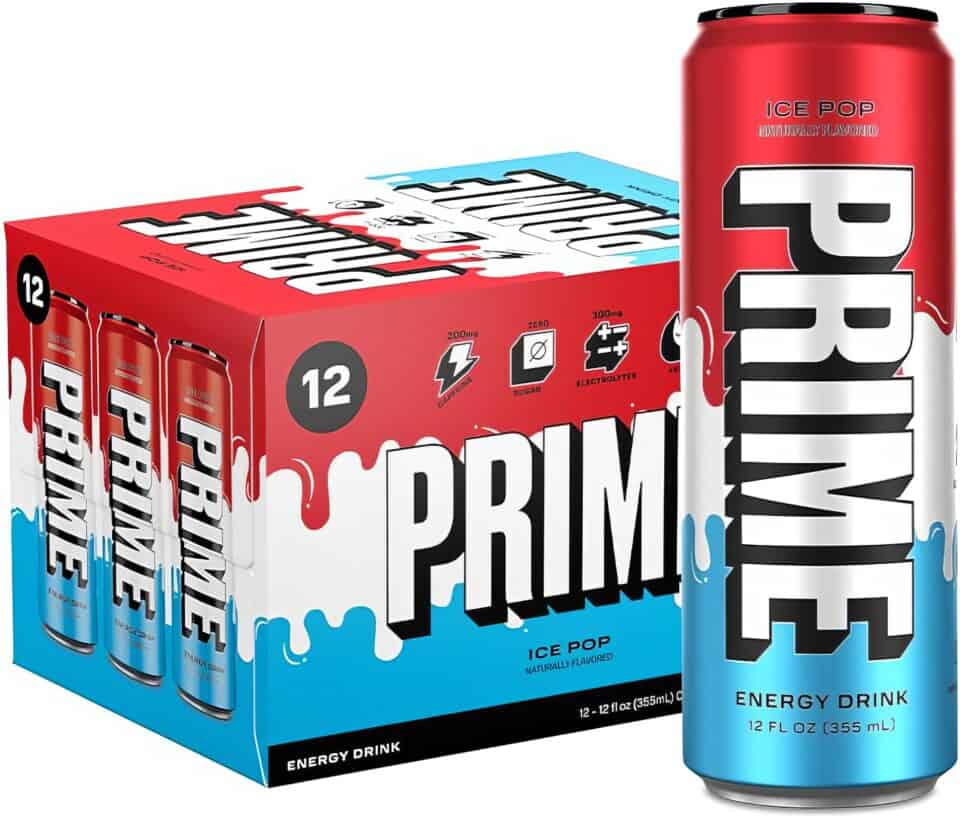
Imagine this: Your youngster barrels through the door, practically bubbling over with excitement about a trendy new drink that’s all the rage at their soccer games. They call it Prime – and let me tell you, it’s got everyone talking.
Thanks in no small part to heavy-hitters like Logan Paul and KSI (also known as Olajide Olayinka Williams “JJ” Olatunji), this brand has taken social media by storm with its two signature offerings: Prime Hydration and Prime Energy.
Now, if we peek into what Prime Hydration is dishing out, it boasts of being a sports drink loaded with electrolytes for rehydrating after some intense playtime or workouts. The flavors? Well, they’re basically a summer fruit medley – imagine diving into an orchard filled with Fuji apples then hopping next door for a splash of coconut water.
It promises refreshment without hitting you with that sugar high because they sweeten things up using substitutes like sucralose rather than piling on spoonfuls of sugar.
On the flip side is its sibling, Prime Energy. This one really turns up the adrenaline pumping straight through your veins; I mean, think about chugging back enough caffeine to rival a pack of soda cans! Now while they tout benefits galore – from BCAAs for muscle recovery to various nutrients purportedly kick-starting metabolism and sharpening focus – any parent scanning those labels knows there’s fine print when it comes to kids bouncing off walls or being wide awake past bedtime due to too much buzz in their system.
So while these drinks may indeed be sweeping the nation and sparking curiosity amongst our little ones – remember that parental discernment goes hand-in-hand with keeping their health (and sanity) top priority.
The Impact of Prime Drinks on Children’s Health
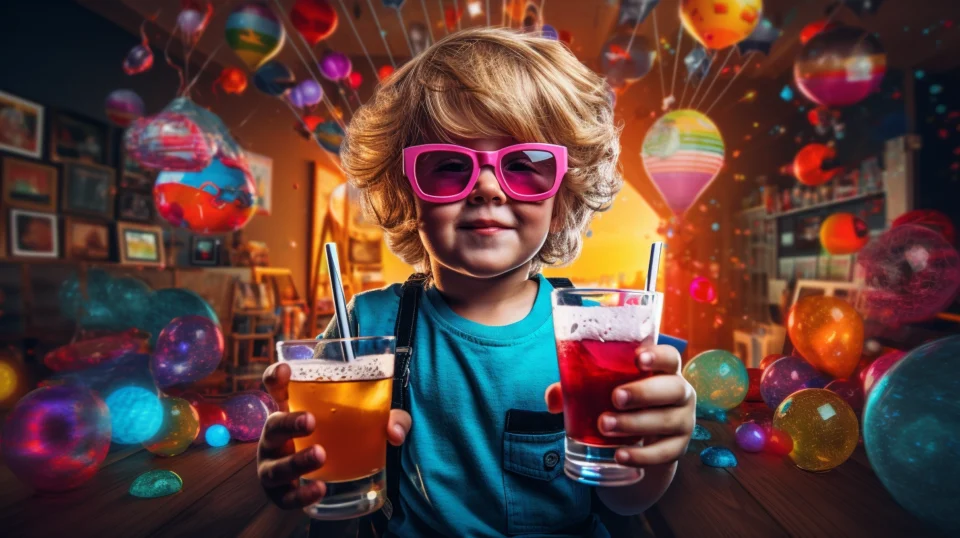
Hey there, fellow moms! So, we’ve gotta chat about something that’s been on my mind… You know those Prime Drinks that are all the rage? Well, let’s dive into how they might be messing with our kiddos’ health.
I’m talking beyond just a sugar rush – there could be more lurking in those cans than meets the eye. Let’s spill the tea (not literally, of course) and get to the bottom of this fizzy conundrum.
High Levels of Caffeine
So, let’s chat about caffeine in those energy drinks. Prime Energy has a whopping 200 milligrams of it per can! That’s like two cups of coffee squished into one little drink. For kids and teenagers, this is seriously big stuff—just too much for their growing bodies to handle.
With all that caffeine racing through them, they could end up feeling jittery or even have trouble sleeping.
Think about it; we don’t want our little ones lying awake at night because they had an energy drink earlier. Sleep is super important for them since that’s when they grow and get ready for the next fun day.
Plus, having too much caffeine can make young hearts beat way faster than usual—not cool at all! And if you’ve ever seen someone who hasn’t had their regular caffeine fix… yikes! Headaches and crankiness are no fun for anyone involved.
Let’s keep those energy drinks away from our kiddos and save ourselves some worry (and sleep!).
Potential Negative Effects
Kids drinking Prime Energy might face some troubles. You see, these drinks pack a big punch of caffeine—200 milligrams in just one can! And it’s not just the buzz from caffeine that’s worrying.
These high-octane sips could lead to sleep problems or even upset stomachs for your little ones.
Also, if you didn’t already know, energy drinks and sports drinks are like apples and oranges; totally different! Sports drinks don’t have those zippy additives like caffeine or guarana that keep folks awake.
That’s why the smart people at the American Academy of Pediatrics say kids should steer clear of energy drinks altogether—it’s all about keeping their hearts safe and helping them catch enough Zzz’s at night.
After all, we want our kids running on natural fuel, not artificial zooms that could make them feel jittery or worse.
Prime Hydration: Is it Safe for Kids?
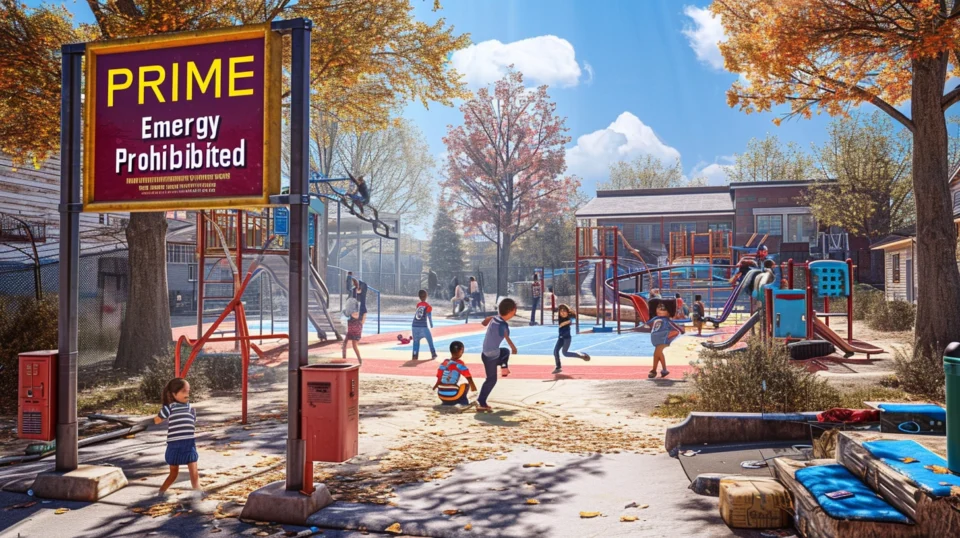
So, let’s talk about Prime Hydration for a sec—everybody and their mother seems to be chugging it these days, right? The burning question is: can the kiddos join in on this trendy sip without any fuss from us worried parents? Let’s dive into whether this colorful bottle of buzz is friend or foe for our little ones…
Analysis of Added Vitamins
Hey there, fellow moms! I want to chat about the vitamins in Prime Hydration and if they’re good for our kids. We all want what’s best for them, right?
- Prime Hydration has some extras like vitamin B, vitamin A, and vitamin E. These are important for energy and keeping bodies healthy. But here’s the thing: vitamins in drinks aren’t always the same as getting them from food.
- Vitamin A helps with eyesight and immune systems. Still, squeezing in carrots or sweet potatoes at dinner does a better job than a quick sip of a drink.
- All those B vitamins are energy boosters. Even so, munching on nuts or whole grains can give your child long-lasting fuel without the crash.
- Vitamin E is great for skin and healing cuts. But hey—snack on almonds or spread some avocado on toast, and you’ve got it covered naturally.
- Adding vitamins to drinks can sound super healthy. However, we’ve got to watch out—it doesn’t mean it’s okay to have these drinks all the time.
- Sure, these drinks don’t have caffeine, which is great! The American Academy of Pediatrics says kids should stay away from caffeinated drinks altogether.
- Homemade hydration beverages can be way better for kiddos. We can mix in natural vitamins and electrolytes that they need when they’re running around like little superheroes.
The Popularity of Prime Drinks Among Kids
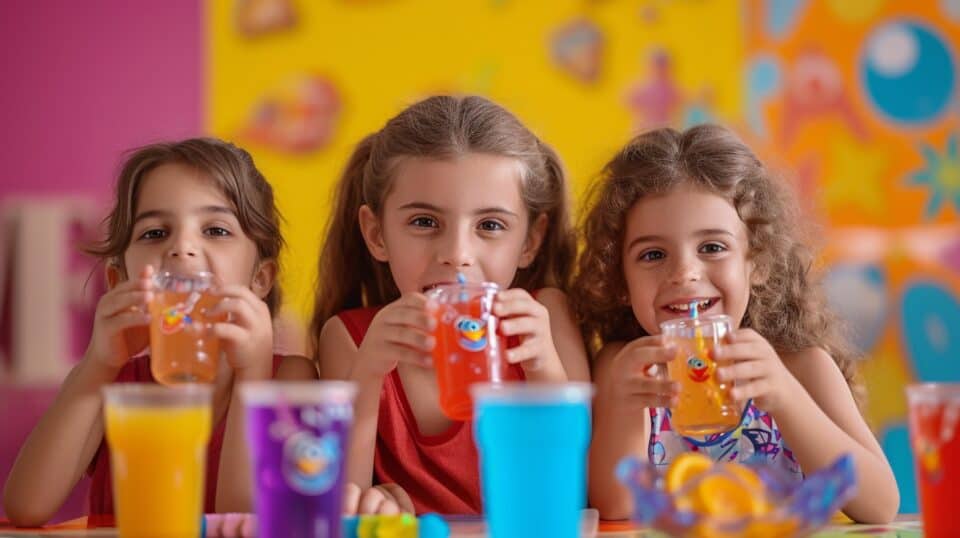
Kids these days just can’t seem to get enough of Prime Drinks. You might have seen them — bright bottles, often clutched in the hands of young folks on their way to school or after sports practice.
They’re all about that cool factor, especially since big names like Logan Paul and KSI are backing them up. It’s like, suddenly, everyone under 18 thinks it’s the hottest thing to sip on.
And I get it; as a mom, you’ve noticed how these drinks are popping up everywhere: at birthday parties, in backpacks, even in your home fridge! Kids love feeling grown-up with their own special drink.
Plus, those flashy colors and bold flavors really catch their eyes…and taste buds too! But here’s the twist – while these drinks are surging in popularity among youngsters for hydration or just fun times with friends, there’s more beneath that shiny label we ought to chat about.
Alternatives to Prime Drinks for Hydration
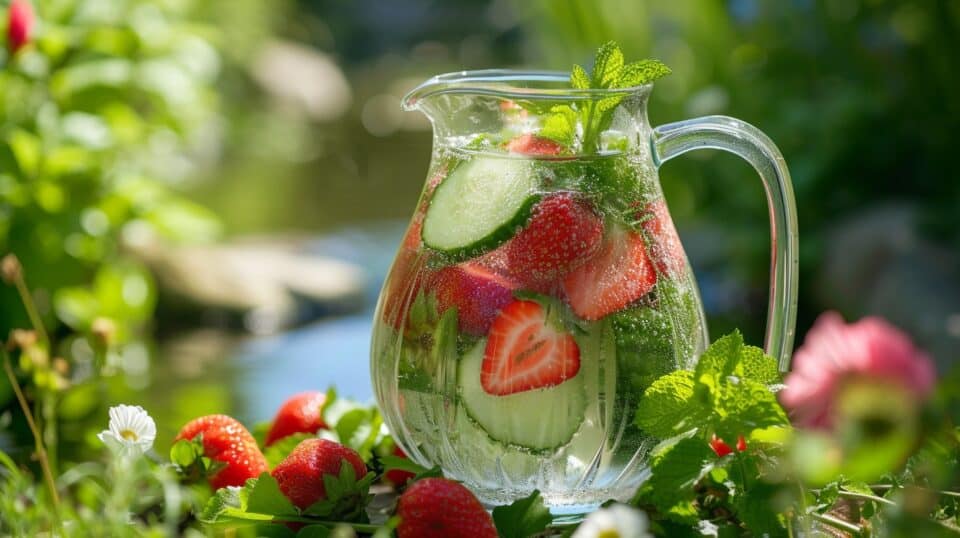
Now, I get it – we all want what’s best for our kiddos, right? So when it comes to keeping them hydrated without reaching for a Prime drink, I’ve got some mom-approved alternatives up my sleeve that you’re gonna love.
Trust me, your little ones won’t even miss the buzz!
DIY Hydration Drinks
I know you care about what your kids drink. You want them to stay hydrated without all the sugar and caffeine in some popular drinks.
- Grab a pitcher of cold water. Start with this as your base for a good, pure drink.
- Squeeze in some fresh lemon or lime. This adds vitamin C and a zesty taste that kids love.
- Stir in a spoonful of honey or real maple syrup. It’s sweet but natural, and way better than artificial sweeteners.
- Slice up fresh fruit like strawberries or oranges. They make the water look fun and taste great too.
- Add cucumber or mint leaves for a cool twist. It’s refreshing, especially on hot days.
- Pop it all in the fridge for an hour. Letting it chill mixes the flavors together just right.
- Pour over ice and serve with a fun straw or umbrella. Kids get excited about drinking something special.
Other Hydration Methods
As moms, we always want the best for our little ones. Hydration is key, but Prime drinks might not be the top choice—let’s talk about some other ways to keep kids hydrated.
- Water is number one. It’s perfect because it has no sugar or caffeine, and it does the job well.
- Milk can be a great option too. It offers calcium for strong bones and helps to hydrate.
- Why not try 100% fruit juice? Just a small cup can give your child both hydration and vitamins.
- Homemade hydration drinks are easy to make. Mix water with a little juice and a pinch of salt—yep, that’s all!
- Fresh fruits and veggies are full of water. Think cucumbers, oranges, or watermelon; they’re like tasty water bombs!
- Chew on this: ice pops made from real fruit juice can cool down and hydrate kids at the same time.
- Coconut water is a natural drink filled with electrolytes—it’s like nature’s own sports drink without all the extras.
- Herbal teas, cooled down, can be soothing and hydrating. But make sure they’re caffeine-free!
- For active kids, consider an oral rehydration solution (ORS). It restores fluids and minerals lost during playtime.
- Flavored waters can work if they don’t have added sugars or sweeteners. Look for natural flavors that tickle their taste buds.
Choosing Water Over Prime Drinks for Kids: A Healthier and Safer Alternative
So, what’s the deal with kids and Prime Drinks? Not the best match. I’m thinking we stick to good old water—it’s safe, cheap, and beats fancy drinks any day. Let’s keep it simple for our kiddos’ health because sometimes that hype just isn’t worth it.
Stay hydrated, stay healthy!
FAQs on Prime Drinks for Kids
Should kids drink Prime energy drinks?
Prime energy drinks are packed with caffeine and sugar, so they’re not great for kids. They can mess up sleep patterns and make kids feel too jumpy.
Can a sports drink like Powerade be okay for children?
Well, while Powerade might help rehydrate after sports, it’s better to stick with water or something like Pedialyte if kids have been running around a lot or have had diarrhea.
Do dietitians think vitamin water is healthier than soda for young people?
Even though we hear “vitamin” and think healthy, these drinks often have lots of sugar—just like soda! So, registered dietitians usually say go easy on them.
What happens if adolescents have tea before bed every night?
Some teas, especially ones with a thing called caffeine—but not Bengal spice tea—can keep you awake! Drinking those might lead to tossing and turning instead of snoozing!
If my child has an energy drink like Red Bull, will they get addicted?
Kids could start depending on the buzz from drinks like Red Bull because of the caffeine. It might even cause withdrawal symptoms when they don’t get their fix (yikes!).
Are there any good reasons why kids would need something like Coke while playing outside?
Not really… Water is always best when you’re out in the sun! Sometimes power stuff—like Gatorade or Monster—is used by athletes, but remember: they’ve got artificial sweeteners that aren’t exactly healthy.
